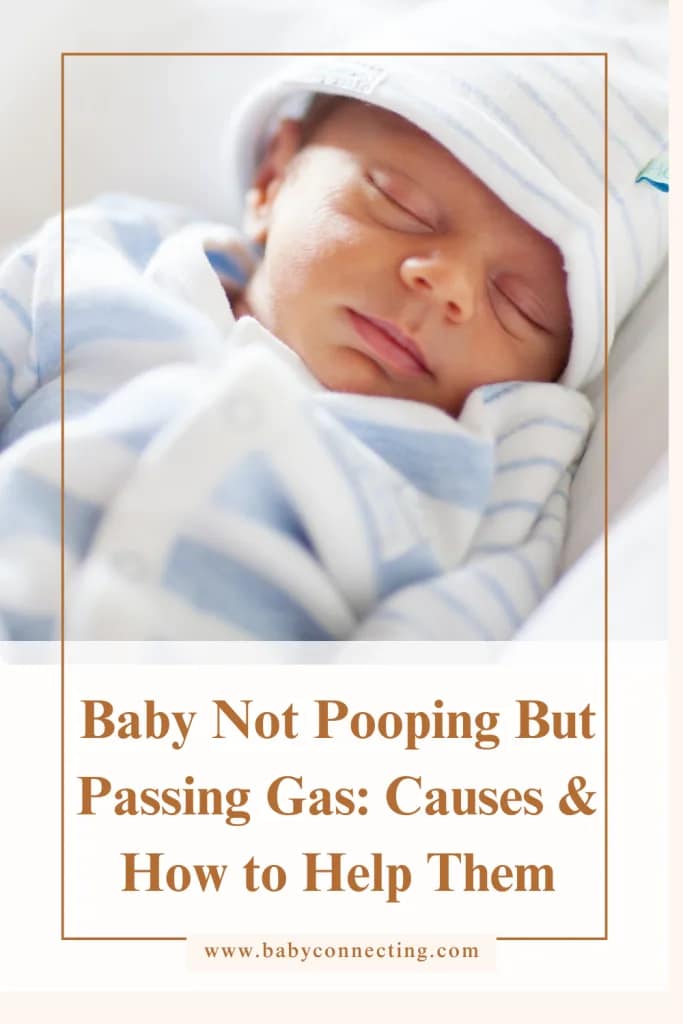Baby Not Pooping But Passing Gas: Causes & How to Help Them
As a parent, it’s natural to keep a close eye on every aspect of your baby’s health, including their digestion. If your baby hasn’t pooped in a while but is passing gas, you might feel concerned or unsure about what’s going on. The good news is that in most cases, this is a normal part of a baby’s development and doesn’t signal anything serious.
In this post, we’ll dive into why your baby might not be pooping but is still passing gas. We’ll also provide practical tips to help relieve their discomfort, promote healthy digestion, and offer reassurance so you can navigate this stage with confidence.

Why Is My Baby Not Pooping But Passing Gas?
It’s common for babies, especially newborns, to go through phases where they pass gas but don’t have regular bowel movements. Here are some of the main reasons this happens:
1. Normal Immature Digestive System
Babies’ digestive systems are still developing during the first few months of life. Their intestines are learning how to coordinate muscle movements, which can sometimes lead to irregular bowel movements. Passing gas is often a sign that their digestive tract is active, even if pooping isn’t happening as often.
2. Breastfed Babies May Poop Less Often
If your baby is breastfed, it’s completely normal for them to go several days without pooping. Breast milk is easily digested and absorbed, leaving very little waste to pass through. As long as they’re comfortable and their tummy isn’t hard or bloated, there’s no need to worry.
3. Formula Sensitivity
Formula-fed babies may experience irregular bowel movements if their formula doesn’t suit their digestive system. Some formulas can cause constipation or make stool firmer, leading to less frequent pooping but normal gas production.
4. Constipation
Babies can occasionally become constipated, which means their stool is hard or difficult to pass. This might happen if they’re dehydrated, starting solid foods, or sensitive to certain formulas or foods.
5. Gas Buildup
Gas buildup happens when babies swallow air while feeding or crying. It can lead to bloating and discomfort but doesn’t always mean they’re ready to poop.
6. Diet Changes
For older babies transitioning to solid foods, their digestive system needs time to adjust. Certain foods, especially those low in fiber, can slow down bowel movements temporarily.

When Should I Be Concerned?
In most cases, not pooping while passing gas isn’t a cause for alarm. However, you should contact your pediatrician if you notice any of the following symptoms:
- Hard, distended, or bloated tummy
- Signs of discomfort or excessive crying
- Blood in the stool or diaper
- Vomiting or refusal to eat
- More than 7–10 days without a bowel movement (for newborns)
These symptoms could indicate a more serious issue, such as an intestinal blockage or severe constipation, that requires medical attention.
How to Help Your Baby Poop
If your baby seems uncomfortable or hasn’t had a bowel movement in a while, there are several safe and gentle ways to help get things moving. Let’s break it down:
1. Massage Their Tummy
A gentle belly massage can help stimulate your baby’s intestines and relieve gas. Use your fingertips to make circular motions on their tummy, moving in a clockwise direction. This mimics the natural direction of digestion and encourages the movement of stool.
2. Bicycle Their Legs
Lay your baby on their back and gently move their legs in a cycling motion, as if they’re riding a bicycle. This activity helps release trapped gas and can stimulate the bowel to start working.
3. Tummy Time
Placing your baby on their tummy for short periods not only strengthens their muscles but also helps encourage digestion. The gentle pressure on their abdomen can aid in relieving gas and promoting bowel movements.
4. Offer a Warm Bath
A warm bath can relax your baby’s muscles and provide relief from discomfort. It’s also a soothing way to encourage their body to naturally let go of tension that might be contributing to delayed pooping.
5. Check Their Feeding Technique
If your baby is swallowing a lot of air during feedings, it might contribute to gas buildup. Ensure they’re latching properly if breastfeeding, or hold the bottle at an angle to reduce air intake if bottle-feeding. Burp them frequently during and after feeds.

6. Adjust Their Diet
If your baby has started solids, introduce high-fiber foods like pureed pears, prunes, or peas to help regulate their bowel movements. For formula-fed babies, talk to your pediatrician about switching to a gentler formula if constipation is a recurring issue.
7. Stay Hydrated
For babies over 6 months old, offering small amounts of water can help soften stool and improve bowel movements. However, for younger infants, rely on breast milk or formula to provide adequate hydration.
8. Use Glycerin Suppositories (Only If Advised)
In cases of severe constipation, your pediatrician may recommend glycerin suppositories. These can provide quick relief but should only be used as a last resort and under medical guidance.
Preventing Digestive Discomfort
While occasional irregularity is normal, there are steps you can take to promote healthy digestion and prevent future issues.
1. Stick to a Feeding Schedule
Maintaining a consistent feeding schedule helps regulate your baby’s digestion. Whether breastfeeding or bottle-feeding, regular intervals can reduce gas buildup and keep bowel movements predictable.
2. Watch for Food Sensitivities
For babies on formula or solids, monitor their reaction to new foods. Some may cause constipation or gas, while others may promote smoother digestion.
3. Keep Them Active
Movement plays a key role in digestion, even for babies. Tummy time, gentle massages, and interactive play can keep their system active and functioning well.
4. Avoid Overfeeding
Overfeeding can lead to gas and discomfort. Pay attention to hunger cues, and don’t force-feed your baby. A calm feeding environment also reduces air swallowing.
Stay Positive and Reassured
It’s easy to feel worried when your baby isn’t pooping regularly, but remember that every baby is different. What’s normal for one baby may look different for another. As long as your little one is eating well, gaining weight, and generally content, irregular bowel movements are usually no cause for concern.
Instead of focusing solely on the frequency of pooping, pay attention to your baby’s overall behavior and well-being. Happy, healthy babies may pass gas without pooping for several days, and that’s perfectly fine.
When to Consult Your Pediatrician
If you’ve tried the above tips and your baby is still struggling with discomfort, it’s worth consulting your pediatrician. They can rule out underlying issues and provide tailored advice based on your baby’s needs. Always trust your instincts—if something feels off, don’t hesitate to seek professional guidance.
Conclusion
When your baby isn’t pooping but is passing gas, it’s usually just a temporary phase tied to their developing digestive system. By understanding the potential causes and trying simple remedies like tummy massages, cycling their legs, or adjusting their diet, you can support their comfort and digestion.
Parenthood is full of learning curves, and this is just one of them. Trust that you’re doing a wonderful job, and remember that your baby’s body is incredibly resilient. With patience, care, and the tips shared here, you’ll soon see their digestion back on track, leaving you both smiling and at ease!


